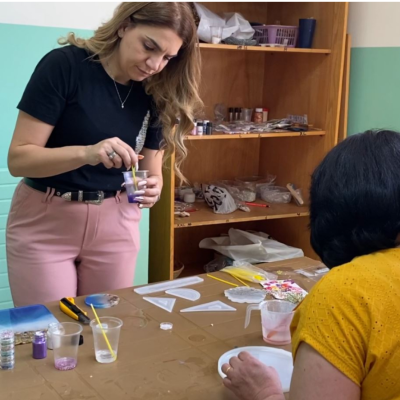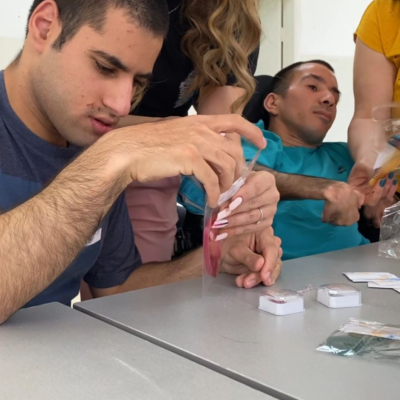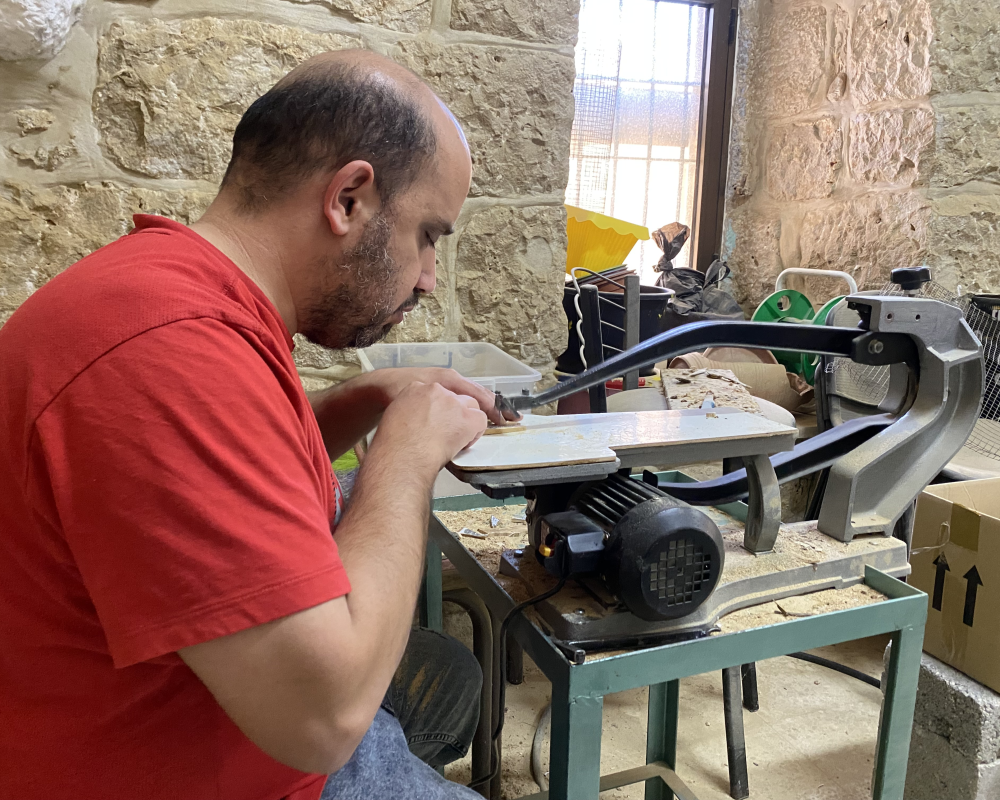
Beit Jala/PNN/
Jamima Foundation, which focuses on children with severe and moderate physical disabilities, seeks to provide quality services aimed at opening opportunities for them to play an active role in society, away from the societal perception that they are inactive members incapable of contributing. The foundation has provided vocational training programs for them, challenging this societal perception. It launched vocational training programs in olive wood and epoxy resin industries, aiming to engage individuals with disabilities for extended hours while providing them with a source of income to meet their various needs. These initiatives give them a sense of being positively impactful in their community.
Lana Al-Zugbi, the director of Yameema Foundation, stated that she has been working in this institution since 2011 and is pursuing a doctoral degree in special education to further her journey in assisting individuals with special needs comprehensively. She added that they strive to give their utmost to become integral parts of society, working on improving their mental, physical, emotional, and social performance.
"People with disabilities are capable of contributing even through vocational training programs," she emphasized.
The foundation recently launched two vocational training programs for individuals with severe and moderate disabilities. The first is the resin or epoxy program, where they craft models of letters, medals, and medical tools artistically from this material. They enrolled in several training courses in this field to assist students in their work, considering the motor difficulties involved, as this work is delicate and challenging for people with disabilities. They decided to take on roles in product packaging, cutting paper, and wrapping the product inside bags, providing them with the opportunity to fill their time, giving them a sense of importance as they engage in activities that contribute to enhancing their presence in both the institution and the community they live in.
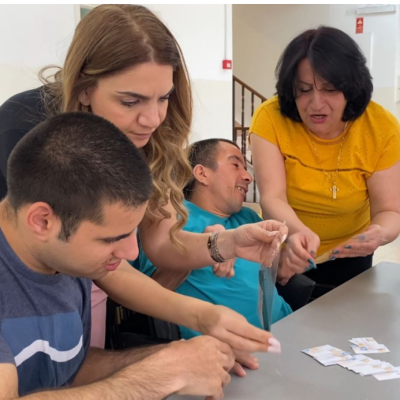
Lana Al-Zugbi added that the second program is the olive wood industry program, managed by one of the institution's own, Bahaa Samra, who was raised and nurtured within it. He was enrolled at the Salesian School to learn olive wood crafting until he became a creative young man in this field, with beautiful ideas drawn from both the internet and visits to other institutions working in the same field. Most of their works go to foreign tourists, Eastern antiques shops, and also to "Dar Al Mujawis" institution, which regularly purchases their works and pays the institution. Bahaa receives an official salary like any other employee within the institution and now sustains himself and his family through this income.
she pointed out that all individuals, whether with severe, moderate, or compound disabilities, are capable of doing something, even if it's small. Some take ten steps, while others take only one, depending on the individual and their condition. The institution aims to identify each person's strengths, even if the work is simple but significant for them psychologically. She stressed that the institution helps them on multiple levels - psychological, social, and economic - to make them feel important and capable of achieving all tasks.
She also stated that the financial returns from the projects they work on within the institution are returned to them through buying gifts, organizing recreational trips for them, and also giving them money to go and buy whatever they want independently, fostering their self-reliance and giving them a sense of ownership over their efforts and earnings.
Lana Al-Zugbi praised the supportive parents who are the first supporters of their children, caring for them and always striving to provide all their needs for their continued success and contribution.
The second program: Epoxy for crafting ornaments and tools in a more beautiful way
Hanan Benoura a teacher at Jamima for many years said she found the resin project and proposed it to the administration, which was a good idea. They took several courses to enhance their skills to give children the opportunity to work with it. After working with it, she found it to be intricate and not easy for children to work with, so they shifted towards making gifts, which was easier for them.
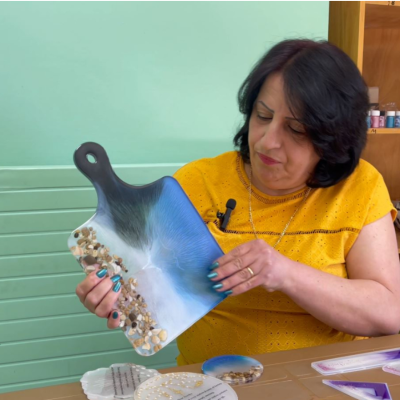
Benoura stated that the children are happy to have produced something and feel they have a presence in the institution and society, giving them a sense of belonging. All the financial returns go to the children to make them feel that their efforts matter, boosting their self-confidence and making them more productive members of society.
Social Obstacles Facing People with Disabilities
Returning to Al-Zugbi, the director of Yameema Foundation, she mentioned numerous obstacles hindering their work at times. One of these obstacles is the financial situation of the institution, as they rely entirely on external support, weakening their ability to provide all the necessary resources needed by the students to enhance their abilities.
She also noted that some parents face financial challenges and cannot afford transportation for their children to the institution. In such cases, the institution arranges transportation for them using its own bus, both to and from their homes.
Furthermore, she highlighted societal rejection faced by some individuals with disabilities from the surrounding community. Some people fear them and hesitate to welcome them into their establishments, especially recreational facilities. Others simply do not accept them and view them as incapable individuals. She added that the institution aims to conduct awareness-raising workshops for the local community to develop a more inclusive culture regarding people with disabilities.
Al-Zugbi emphasized the importance of introducing vocational training for individuals with severe and moderate disabilities to prove their ability to contribute and provide them with opportunities to occupy their time with meaningful activities. This helps them feel like integral parts of society and capable of making a difference. She expressed satisfaction in seeing children with disabilities feeling proud of themselves after completing any tasks.
Bahaa Samra, one of the beneficiaries within the institution and raised within Jamima
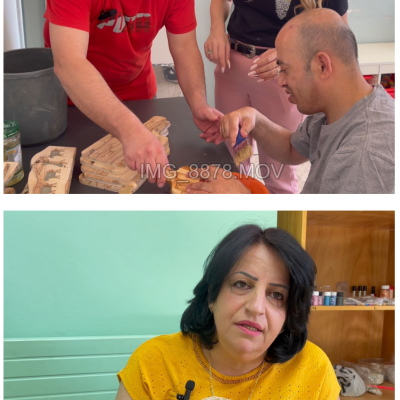
Bahaa Samra, a member of the Jamima family, mentioned that he was raised and has lived within the institution since childhood.
He feels deeply connected to it, as it helped him develop his passion for olive wood crafting. He enrolled in the Salesian Industrial School with support from Yameema Foundation and became proficient in olive wood crafting. He now sells his creations to foreign tourists and visitors, including puzzles, a map of Palestine, and wooden animals beloved by children, as well as crafting names and medals from olive wood.
He began this craft at the age of 15 because he loves it and has a creative mind that generates beautiful ideas that captivate people's attention.
Most of his works are sold in the Netherlands and abroad due to their precision and beauty. Additionally, institutions from Bethlehem also request olive wood works from them. He added that these ideas originate from his mind, the internet, or any requests made by customers.
After succeeding in his personal experience, Bahaa now helps the institution's management and strives to assist in the development efforts of his fellow youth and children within the institution. He teaches them his craft, acknowledging their varying abilities. He feels a great sense of fulfillment as he watches his peers work, assisting them in painting wooden works after completing his own tasks. He emphasized his readiness to always share his expertise with his peers to help them.
Bahaa mentioned a decrease in demand for wooden works due to the challenging circumstances faced by our people in the West Bank and Gaza Strip, as well as the decline in tourism and the absence of tourists visiting Bethlehem, known as the city of tourism. Nevertheless, they continue to work despite the difficulties and crises, hoping for peaceful and stable days ahead.
Jamima Foundation is a Dutch charitable organization, and all support comes from Dutch institutions and churches. The foundation comprises three programs: firstly, the residential house, which accommodates approximately 40 beneficiaries aged 3 to 47, categorized by age, degree of disability, and social background. Additionally, there's the morning center, hosting 20 children daily from the Bethlehem governorate.
They also provide physical and occupational therapy, speech therapy, educational support, and non-curricular activities tailored to each child's abilities. Recently, psychological therapy has been introduced for its importance in improving the mental well-being of individuals within the institution, both students and staff.
This story was produced as part of the "Qareeb" program implemented by the French Agency for Media Development (CFI) in partnership with funding from the French Agency for International Cooperation (AFD).
